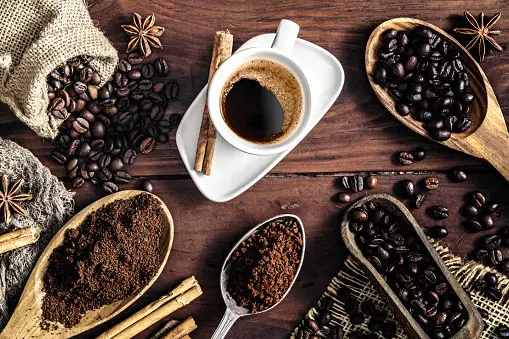In today’s bustling world, coffee doesn’t just start our day; it’s intertwined with our moments of connection, bursts of inspiration, and much-needed pauses. Amidst the globe’s growing coffee culture, understanding how this beloved beverage affects us becomes increasingly important, especially for coffee enthusiasts, health-conscious individuals, and home-brewers alike. This deep dive into the caffeine content in medium roast coffee will illuminate not just the brew in your cup but how it impacts your energy, health, and brewing preferences.

What Is Caffeine, and How Does It Affect Us?
Caffeine is a natural stimulant found in coffee beans that invigorates the central nervous system, warding off drowsiness and restoring alertness. But its effects don’t stop at keeping us awake; they extend to enhancing our focus, improving our mood, and even stimulating our metabolism. However, sensitivity to caffeine varies, with its impact influenced by factors like body weight, metabolism, and tolerance levels.
The Factors Influencing Caffeine Content in Coffee
Not all brews are created equal when it comes to caffeine content. Several factors play pivotal roles, from the type of coffee bean (Arabica vs. Robusta) and its roast level to the brewing method used. It’s a common misconception that darker roasts contain more caffeine. In reality, the roasting process affects bean size and density, which in turn influences caffeine levels when measured by scoop or by weight.
The Medium Roast Profile
Straddling the line between the light and dark spectrums, medium roast coffee is celebrated for its perfect balance of acidity and robust flavor profile, making it a favorite among coffee lovers. But what about its caffeine content? Interestingly, medium roast coffee offers a caffeine level that is comparable to light and dark roasts when measured by weight. However, because dark roasting reduces bean weight, using a scoop as a measurement can actually result in more caffeine in a medium roast compared to a dark roast.
Health Considerations of Medium Roast Coffee
For those concerned with health, medium roast coffee presents several noteworthy attributes. This roast level not only preserves many of the beans’ antioxidants but also minimizes the creation of potentially harmful chemicals that can occur in darker roasts. These antioxidants are linked to reducing inflammation and protecting against certain diseases. However, despite its benefits, moderation is key, as excessive caffeine intake can lead to insomnia, anxiety, and digestive issues.
Optimizing Caffeine Extraction in Home Brewing
Home-brewers, take note: extracting the optimal amount of caffeine from your medium roast coffee is as much an art as it is a science. Factors such as grind size, brewing time, and water temperature significantly influence caffeine extraction. A finer grind and longer brewing time, along with hotter water, generally increase caffeine levels in your cup. Experimenting with these variables can help you find your ideal balance between flavor and caffeine content.
Comparing Caffeine Levels Across Coffee Types
To put things in perspective, the caffeine content in medium roast coffee generally ranges from about 95 to 200 mg per 8-ounce cup, though this can vary widely based on brewing methods. In comparison, a similarly sized cup of light roast might contain slightly more caffeine due to less bean density, whereas dark roasts might offer a tad less for the reasons previously discussed. Specialty coffee drinks like lattes and espressos often have different caffeine levels due to varying coffee-to-water ratios.

Frequently Asked Questions (FAQs)
Q: Does the type of coffee bean affect the caffeine content?
A: Yes, the type of coffee bean significantly influences caffeine content. Arabica beans, known for their smooth flavor, generally contain less caffeine than robusta beans, which are more bitter but pack more caffeine.
Q: How does the brewing method impact caffeine extraction?
A: Different brewing methods can extract caffeine at different rates. Espresso often has more caffeine per ounce than drip coffee, although a standard cup of drip coffee contains more total caffeine due to its larger volume.
Q: Can the time of day I drink coffee affect how caffeine impacts me?
A: Absolutely. Caffeine sensitivity varies throughout the day based on your circadian rhythm. Drinking coffee late in the day can interfere with sleep patterns for some people.
Q: Is there a way to reduce caffeine in my medium roast coffee without switching to decaf?
A: Yes, you can reduce caffeine content by adjusting your brewing method, such as using less coffee or brewing for a shorter time. Steeping coffee grounds in cold water for an extended period (cold brew) also results in slightly less caffeine extraction compared to hot brewing methods.
Q: How can I measure the caffeine content in my home-brewed coffee?
A: While it’s challenging to measure caffeine content accurately at home without scientific equipment, you can get a rough estimate based on the type of beans, your brewing method, and the amount of coffee you use. Most packaged coffees provide caffeine content estimates on their labeling as well.
Q: Are there health benefits to drinking medium roast coffee specifically?
A: Medium roast coffee retains a significant amount of antioxidants, which can provide various health benefits, including reduced inflammation and a lower risk of some diseases. Its balanced flavor profile also makes it a preferred choice for many, providing an enjoyable way to incorporate these beneficial compounds into your diet.
Conclusion
Navigating the coffee world’s intricacies can be as complex as the flavors in your cup. Whether you’re a seasoned coffee aficionado or someone who cherishes a single morning cup, understanding the nuances of caffeine in medium roast coffee can enhance both your appreciation for coffee and its role in your daily life. We encourage you to share your experiences, tips, and personal preferences in the comments. How does medium roast coffee fit into your life? What techniques do you use to brew the perfect cup?






